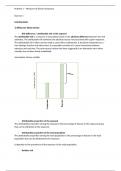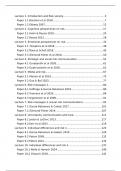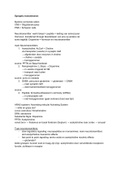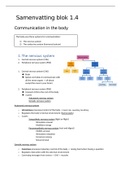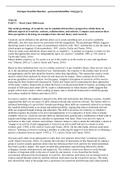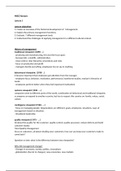Social Philosophy
Lecture 1
Hobbes and the state
In search of legitimation of state power
Starting questions
• Main question:
- Hobbes (1588-1679): How to offer a philosophical legitimation of state power?
• Preliminary questions:
- What is the state?
- How did the state originate?
What is the state?
- ‘’The state is a form of human association distinguished from other social groups by the
purpose, the establishment of order and security; its methods, the laws and their
enforcement; its territory, the area of jurisdiction or geographic boundaries; and finally by its
sovereignty. The state consists, most broadly, of the agreement of the individuals on the
means whereby disputes are settled in the form of laws’’ (Encyclopedia Britannica)
- ‘’Human community that (successfully) claims the monopoly of the legitimate use of physical
force within a given territory’’ (Max Weber, Policitcs as Vocation (1918))
- Sovereignty
- Centralization: monocentrist (= one source of power)
- Vertical power (top down)
- Territory
- Monopoly on violence
- General laws
- Population
- Distinction between private and public (interest)
- Abstract, symbolic representation (you will only encounter representatives of the state)
- Modern (!)
Before the modern state
• Polycentrism
o Nobility
o Church
o Cities
• Lack of a monopoly on force
• customary laws
• Troubled distinction between private and public
• Disputed territories
• Religious foundations
,Hobbes and his historical context
- Thomas Hobbes (1588-1679)
- The turbulent 16th and 17th centuries
- English Civil War (1641-42)
- Colonialism
- Early Capitalism
- Scientific revolution
- Secularization
Hobbes legitimation: starting points
- A secular legitimation/ foundation
- State as a ‘institution’
- Based on scientific principles
- Not a historical genealogy
- State as a form of separation
- Early liberalism: justification of restrictions
A philosophical anthropology
- ‘’(…) political philosophy begins with the study of human nature’’ (Wolff p.9)
- Materialism
‘’What is the Heart, but a Spring; and the Nerves but so many Strings; and the Joynts, but so
many Wheeles, giving motion to the whole body…?’’
- Compare: Descartes, Vesalius
- Inspired by Galileo’s Principle of the Preservation of Motion
- Life as Motion
- Desire
- Felicity: success in achieving the objects of desire
- Power as a means to achieve the objects of desire
‘’A restless desire of Power after power that ceaseth only in death’’ (Hobbes quoted by
Wolff, p.10)
- ‘’Nature has made man equal (…) in their physical and meantal capacities (…)’’ (Hobbes, p.56)
- ‘’This equality of ability produces equality of hope for the attaining of our goals. So if any two
men want a single thing which they can’t both enjoy, they become enemies’’ (Hobbes, p.56)
- Equality – scarcity – competition
- General distrust
o Strike first
- The need for glory
o Honor and reputation
To summarize:
- Motion: man as being he tries to obtain objects of desire
- Equality
- ‘’So that in the nature of man, we find three principal causes of discord. First competition,
secondly distrust, thirdly glory. the first makes man invade for gain, the second for safety;
and the third for reputation.’’
,State of nature
- A war of all against all
- Constant threat of violence
- No civilization
o No agriculture
o No economy
o No higher culture
- No just and unjust, no morality
- Life as ‘poor, nasty, brutish, and short’
- Not a historical concept
- A thought experiment
o Given our nature (anthropology)
o what would a life without regulation power look like? (State of nature)
- Hypothesis
- Yet, with empirical references
o Civil war
o ‘locking our doors’
o Relations between nation states
A colonial and racist dimension…
How to escape?
‘’So much for the poor condition that is actually placed in by mere nature; but as I now go on to
explain, he can extricate himself from it, partly through his passions, partly through his reason. The
passions that incline men to peace are fear of death, desire for things that are necessary for
comfortable living and a hope to obtain these by hard work. And reason suggests convenient items in
a peace treaty that men may be got to agree on. These items are the ones that on other contexts are
called the Laws of Nature’’ (Hobbes, Leviathan, p.59)
Contract and natural laws
- ‘State of nature’ and ‘right of nature’
- Reason → Agreement/ contract
- Law of nature: ‘’a command or general rule discovered by reason’’
o Seek peace and follow it
o Lay down his right to everything (if others do)
o Men should perform the convenants they make
- Individual and collective rationality
- Collective agreement: legitimacy and justice
Commonwealth
- The need for coercive power
- A transfer of power to the sovereign
- Source of unity
- A ‘motal God’
- An institution
‘’When some man or assembly of men is chose by majority vote to present the person of them all
(i.e. to be their representative), each of them will authorize all the actions and jugements of that man
, or assembly of men as thought they were his own, doing this for the purpose of living peacefully
among themselves and being protected against other men. This binds those who did not vote for this
representative, as well as those who did.’’ (p.80)
Critical evaluation
- State of nature as a product of the state
- Hypothetical consent
- Who is allowed to form an agreement?
- A pessimistic anthropology
- state as source of extreme violence
Lecture 2
Karl Marx (1818-1883)
- Trier, 1818
- Marx and the left Hegelians
- Paris, 1840’s
- Friedrich Engels
- 1848 and the Communist Manifesto
- London
- Capital (1867)
- The rise of the socialist movement
- the Marx family
A few preliminary remarks
- Political philosophy is political
- Marx and Marxism
- Marx as a philosopher
- Marx as a social scientist
- Why study Marx?
Capitalism: a definition
- What is capitalism?
o Dominance of private property
o Private property of means of production
o Wage labor
o Market competition
Capitalism as a historical system
- Historical institution
- ‘’Primitive accumulation’’
o Enclosure of the commons
o Colonialism
- Industrialization and means of production
- Proletarians
Lecture 1
Hobbes and the state
In search of legitimation of state power
Starting questions
• Main question:
- Hobbes (1588-1679): How to offer a philosophical legitimation of state power?
• Preliminary questions:
- What is the state?
- How did the state originate?
What is the state?
- ‘’The state is a form of human association distinguished from other social groups by the
purpose, the establishment of order and security; its methods, the laws and their
enforcement; its territory, the area of jurisdiction or geographic boundaries; and finally by its
sovereignty. The state consists, most broadly, of the agreement of the individuals on the
means whereby disputes are settled in the form of laws’’ (Encyclopedia Britannica)
- ‘’Human community that (successfully) claims the monopoly of the legitimate use of physical
force within a given territory’’ (Max Weber, Policitcs as Vocation (1918))
- Sovereignty
- Centralization: monocentrist (= one source of power)
- Vertical power (top down)
- Territory
- Monopoly on violence
- General laws
- Population
- Distinction between private and public (interest)
- Abstract, symbolic representation (you will only encounter representatives of the state)
- Modern (!)
Before the modern state
• Polycentrism
o Nobility
o Church
o Cities
• Lack of a monopoly on force
• customary laws
• Troubled distinction between private and public
• Disputed territories
• Religious foundations
,Hobbes and his historical context
- Thomas Hobbes (1588-1679)
- The turbulent 16th and 17th centuries
- English Civil War (1641-42)
- Colonialism
- Early Capitalism
- Scientific revolution
- Secularization
Hobbes legitimation: starting points
- A secular legitimation/ foundation
- State as a ‘institution’
- Based on scientific principles
- Not a historical genealogy
- State as a form of separation
- Early liberalism: justification of restrictions
A philosophical anthropology
- ‘’(…) political philosophy begins with the study of human nature’’ (Wolff p.9)
- Materialism
‘’What is the Heart, but a Spring; and the Nerves but so many Strings; and the Joynts, but so
many Wheeles, giving motion to the whole body…?’’
- Compare: Descartes, Vesalius
- Inspired by Galileo’s Principle of the Preservation of Motion
- Life as Motion
- Desire
- Felicity: success in achieving the objects of desire
- Power as a means to achieve the objects of desire
‘’A restless desire of Power after power that ceaseth only in death’’ (Hobbes quoted by
Wolff, p.10)
- ‘’Nature has made man equal (…) in their physical and meantal capacities (…)’’ (Hobbes, p.56)
- ‘’This equality of ability produces equality of hope for the attaining of our goals. So if any two
men want a single thing which they can’t both enjoy, they become enemies’’ (Hobbes, p.56)
- Equality – scarcity – competition
- General distrust
o Strike first
- The need for glory
o Honor and reputation
To summarize:
- Motion: man as being he tries to obtain objects of desire
- Equality
- ‘’So that in the nature of man, we find three principal causes of discord. First competition,
secondly distrust, thirdly glory. the first makes man invade for gain, the second for safety;
and the third for reputation.’’
,State of nature
- A war of all against all
- Constant threat of violence
- No civilization
o No agriculture
o No economy
o No higher culture
- No just and unjust, no morality
- Life as ‘poor, nasty, brutish, and short’
- Not a historical concept
- A thought experiment
o Given our nature (anthropology)
o what would a life without regulation power look like? (State of nature)
- Hypothesis
- Yet, with empirical references
o Civil war
o ‘locking our doors’
o Relations between nation states
A colonial and racist dimension…
How to escape?
‘’So much for the poor condition that is actually placed in by mere nature; but as I now go on to
explain, he can extricate himself from it, partly through his passions, partly through his reason. The
passions that incline men to peace are fear of death, desire for things that are necessary for
comfortable living and a hope to obtain these by hard work. And reason suggests convenient items in
a peace treaty that men may be got to agree on. These items are the ones that on other contexts are
called the Laws of Nature’’ (Hobbes, Leviathan, p.59)
Contract and natural laws
- ‘State of nature’ and ‘right of nature’
- Reason → Agreement/ contract
- Law of nature: ‘’a command or general rule discovered by reason’’
o Seek peace and follow it
o Lay down his right to everything (if others do)
o Men should perform the convenants they make
- Individual and collective rationality
- Collective agreement: legitimacy and justice
Commonwealth
- The need for coercive power
- A transfer of power to the sovereign
- Source of unity
- A ‘motal God’
- An institution
‘’When some man or assembly of men is chose by majority vote to present the person of them all
(i.e. to be their representative), each of them will authorize all the actions and jugements of that man
, or assembly of men as thought they were his own, doing this for the purpose of living peacefully
among themselves and being protected against other men. This binds those who did not vote for this
representative, as well as those who did.’’ (p.80)
Critical evaluation
- State of nature as a product of the state
- Hypothetical consent
- Who is allowed to form an agreement?
- A pessimistic anthropology
- state as source of extreme violence
Lecture 2
Karl Marx (1818-1883)
- Trier, 1818
- Marx and the left Hegelians
- Paris, 1840’s
- Friedrich Engels
- 1848 and the Communist Manifesto
- London
- Capital (1867)
- The rise of the socialist movement
- the Marx family
A few preliminary remarks
- Political philosophy is political
- Marx and Marxism
- Marx as a philosopher
- Marx as a social scientist
- Why study Marx?
Capitalism: a definition
- What is capitalism?
o Dominance of private property
o Private property of means of production
o Wage labor
o Market competition
Capitalism as a historical system
- Historical institution
- ‘’Primitive accumulation’’
o Enclosure of the commons
o Colonialism
- Industrialization and means of production
- Proletarians

